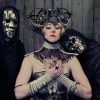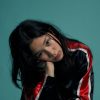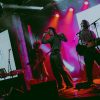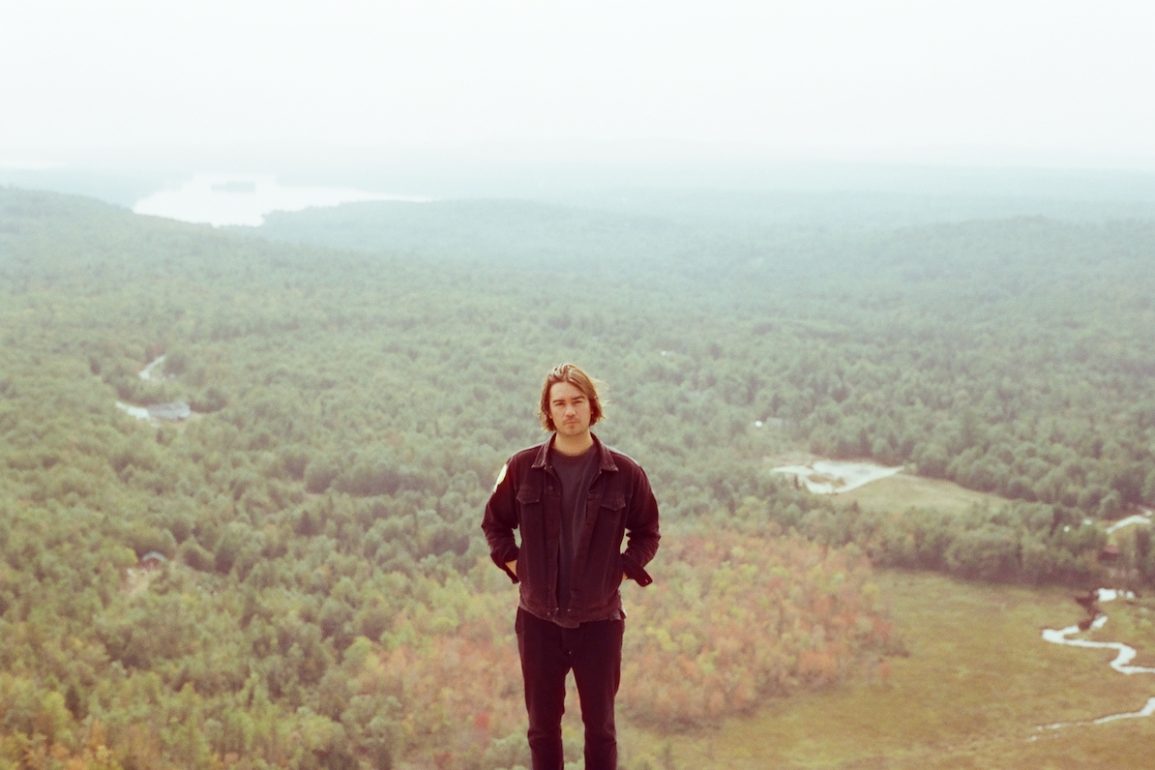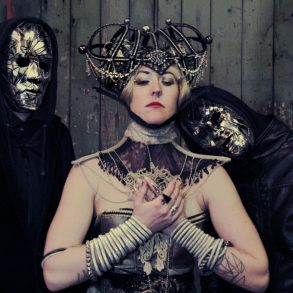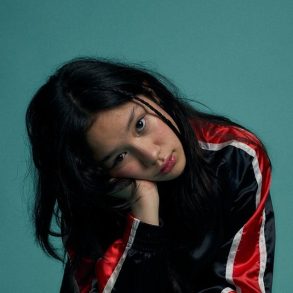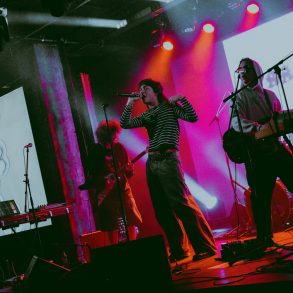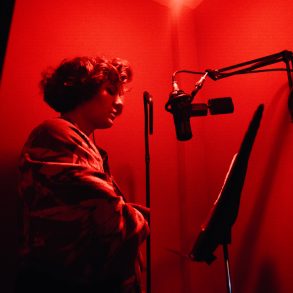Darksoft is a one-man US-based indie rock project blending dreamy guitars, shoegaze textures, and philosophical lyrics. Based in Portland by way of Seattle, he’s been quietly building a solid catalog of concept albums, from Grayscale to Rationalism. When he’s not making music, he’s running Look Up Records and supporting other artists. We sat down with him to chat about his musical influences, sound, and what’s next.
Can you tell us about your musical journey and how you first got into creating music?
I come from a musical family. As a kid, I took piano lessons, trumpet lessons, and then vocals lessons. I’m self-taught on guitar and bass — which led to a lot of trial and error but also helped me develop personal playing styles.
In terms of songwriting, I’ve been writing and recording songs at home since I was a teenager. So, I’ve been at it a while and just haven’t really stopped. Throughout the years, I’ve played in various projects and have added gear to produce in my home studio.
I’ve been recording and performing as Darksoft since 2018. I’ve released a handful of albums, played a good number of shows, and headlined regional tours with some great backing bands. There’s a lot I have yet to do with Darksoft, so the journey is still ongoing! That’s the journey in a nutshell.
How would you describe your music to someone who hasn’t heard it before?
I just say it’s dreamy rock music. Or, dream pop music for existentialists. But I love seeing how others describe it. Down East Magazine describes the sound as “silvery guitar tones that graze ’80s new wave.” Micro Genre Music says it’s like “chiming guitars, dayglo synths and earworm melodies.” Writing for Start Track, Lando Flakes has some poetic synesthesia descriptions. So, there you go.
What are some of your earliest musical influences, and how do they still resonate with your music today?
It’s hard to self-diagnose. But I’m a dude with a baritone voice, so it was easiest to imitate the crooning of Julian Casablancas from The Strokes back in the day. I think I’ve retained a bit of that influence in terms of song structure and keeping things simple.
Some quieter, understated vocalists like Elliott Smith, My Bloody Valentine, or The Dandy Warhols encouraged me with Darksoft. For guitar styles and effects, I turn to Slowdive, The Cure, Dick Dale, Nirvana, or Tears For Fears.
I have a penchant for alternative 80s/90s rock and jangle pop and twee. So, artists like The Jesus and Mary Chain, Echo and The Bunnymen, The Ocean Blue, Joy Division, New Order, Depeche Mode, The Ramones, Orchestral Maneuvers in the Dark, Smashing Pumpkins, Gary Numan, David Byrne, Orange Juice, Edwyn Collins, Primal Scream, The Field Mice, and the C86 album are little specks in the Darksoft DNA.
Are there any genres that you haven’t yet explored but would love to incorporate into your future work?
Yeah, I think I’d like to add a bit more folk influence into the mix as time goes on. Imagine a picky acoustic guitar but with the amplified effects of dream pop, goth, or shoegaze. I’d like to experiment with different psychedelic textures and unexpected chord progressions that blend major/minor modes.
I think the best songwriting sounds familiar but uncanny. I want people to hear it and say, “Hey, that sounds familiar, but I know I’ve never heard this before… who’s that band?” So, we’ll see what approach has that effect as time goes on.
Can you walk us through your typical creative process when writing or recording a new track? Where do you usually start?
Honestly, my process is not all that creative. It’s more like the relaxed ritual of a robot caught in a recursive loop. At the core, I always have an overriding album theme that the new songs speak to. I also like riffs a lot, and motifs seem to come naturally to me.
When making a new song, I usually start with a chord progression I like on guitar. Then, I layer on bass and synth pads and chart out a structure. Throughout that, I’m settling on melodies and a song name that will inform the lyrics.
Lately, I’ve been attracted to simple everyday statements, like cliches or colloquialisms that convey complex thoughts and emotions. For example, “no news is good news,” “as above, so below,” and “rinse and repeat” are concepts I’m working on for my next album, “Everydayness.” (This is my first time sharing this with the world! Release details, TBA).
Then, I look up a bunch of synonymous phrases, stitch them together into a rhyme format, and then record other vocal, guitar, or synth layers, and percussion sound effects when it makes sense. It means a lot to me that I record actual instruments — I don’t use MIDI and don’t use samples. If I do, it’s very sparingly. I usually add live drums last and typically record crashes separately to help with mixing.
What has been your most memorable performance so far?
When I was living in Seattle, I started a mini-fest series called Look Up Fest. With the help of many friends in the Seattle area music community, we threw themed events that paired 10 or so dreamy bands with a fun theme, like paranormal, underwater, and space. The last one was Look Up Fest: Portals in 2022. We brought out about 250 people to The Rendezvous, and bands played across two stages alongside psychedelic visuals and sci-fi props.
Other than that, some memorable shows have been playing at a fall farm party in Washington, playing at an ex-funeral home on tour, and playing on a dock at the Maine Maritime Museum.
How do you approach working with other artists or producers, especially when their style might differ from yours?
I’ve found true collaborations can be tough — especially when there’s not a shared direction from the start. It can slow things down. I prefer to establish a vibe or genre early on, record the core myself, and bring in others when it makes sense.
For my recordings, sometimes I’ll invite guest vocalists or session musicians to add elements to a song that usually are in a similar style. Or, vice-versa, it’s nice when someone invites me to help produce or record for *their* project and they have a clear direction in mind.
When collaborating with people on a project, making a shared playlist of influences is really helpful. Then everyone’s on the same page. This is what I do for mixing and mastering. Lately, I’ve been collaborating with mixing engineer Brian Fisher, and we’ll begin a playlist of influences, tones, and effects, to draw inspiration from before we approach the mixing process at all.
What is a project or milestone you’re most proud of?
Darksoft recently hit 100,000 monthly listeners on Spotify, which I’m incredibly grateful for. A lot of that traction is algorithm-driven, especially around new album releases — my latest, Rationalism, has seen some nice momentum.
While Spotify isn’t the full picture of success, it’s helping grow the name and open doors, like playing festivals, reaching new audiences, and potentially supporting bigger acts on tour. Every follower helps make more of that possible.
If you could collaborate with, or perform alongside any artist, who would it be? And why?
I’m booking a couple of small tours for 2025, and many of the local supporting bands are honestly artists I’d love to — and am looking forward to — performing alongside!
In terms of more established names, I’ve been following Broncho for a while and really dig their latest releases. I think it’d be cool to perform alongside them. Slowdive would be a dream, but I don’t think that’s in the cards.
Others that come to mind are contemporaries in a similar style, like EVNTYD, Indigo Waves, Babe Rainbow, Day Wave, Starflyer 59, or Phantom Youth. I think something might actually be in the works with my pal Hibou soon…
How do you see your sound evolving over the next few years? Are there any new directions or experiments you’re excited to explore?
That’s tough to say! I mentioned some of this above in the answer about what genres I’d like to explore in the future. Most of my albums are built around conceptual themes and are semi-reflective of the current social climate, so in a way, it’s not really up to me.
Regardless, I do want my music to uplift and inspire in an authentic and not cheesy way. I also became a father recently, and that changes your outlook a lot. I think what I’m doing has improved as I feel a sense of alignment and purpose. What you do and say matters and has ripple effects that echo through time. So, I want to keep writing with that North Star in mind.
If you could tour with any band or artist (past or present), who would it be and why?
The Beach Boys! Hopefully, they’d let me play tambourine in their set or something.
How do you handle creative blocks, and what methods do you use to push through them?
Don’t judge your music in the moment. Just finish the song. Then, decide if it’s worth sharing with the world later on. Of course, eventually, you have to just say, “Enough is enough,” and just start releasing, regardless of whether you feel it’s done or not. It is what it is.
I used to get lost in the computer in my DAW, creating loops or half-finished productions. What helped me become a better songwriter was going back to the basics, and literally starting with a paper and pencil and an acoustic guitar. This helps you see the big picture. Also, the pop structure is my friend.
I think the hardest part of my musical journey early on was finding my voice and what I wanted to say. It can take time to realize what resonates most with you, and this is really different from person to person. There is no good advice other than to do what comes naturally.
Lastly, I try to create music that *I* want to hear. Don’t get in your head about what people might think or what age you think you have to be to create or release music. Things are more fluid than that.
Finding a genre or style to work in (and sticking to an artist name, for that matter) was a challenge for me upfront. Since there are millions of styles out there, you can really take music in endless directions, and it’s easy to have analysis paralysis or make a jumbled mess of different styles. I’ve found it’s been helpful to find a very focused genre to write for.
Also, don’t stress about going viral or blowing up on TikTok. If you’re creating art for that purpose alone, you might end up chasing trends instead of your own voice.
Lastly, less is more.
Follow Darksoft:
Website – Instagram – X – Soundcloud – Spotify

